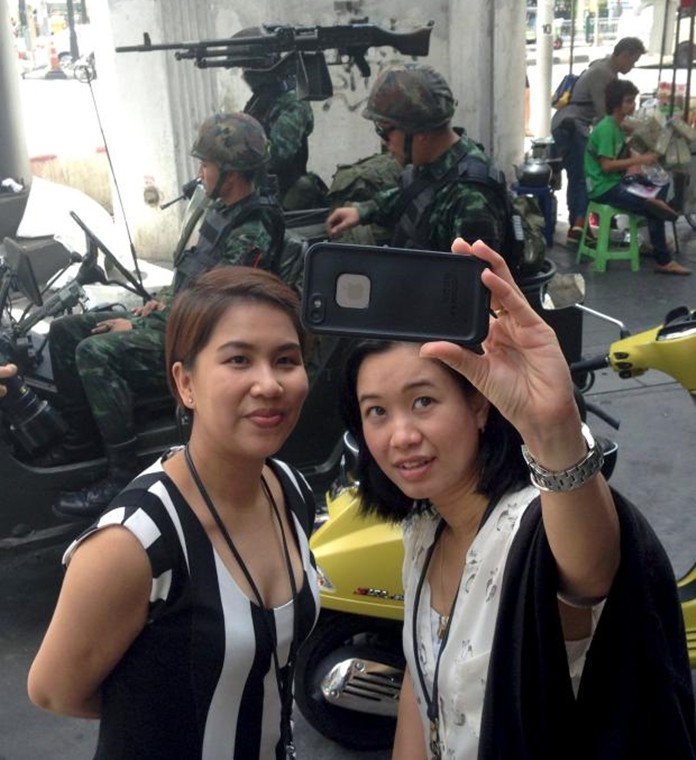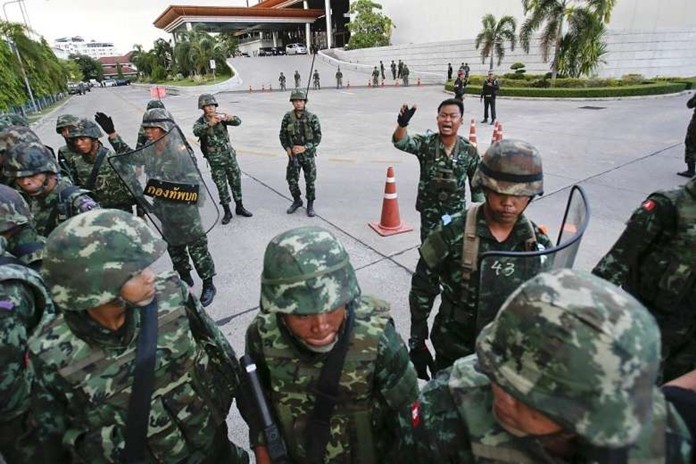
The coup vigilantes are back in force predicting that another putsch is round the next corner. Or even this one. Earlier this week a number of helicopters were spotted in the skies above Bangkok, whipping up the frenzy anew. In Pattaya, which has traditionally held itself aloof from military takeovers, the rumours were fanned afresh after four soldiers in military fatigues were seen poking around on Beach Road. In fact, they were checking the health and safety aspects of the upcoming fireworks display.
Of course, people can point to the fact that top military have been denying the possibility of a new coup for eighty years, even sometimes when the tanks were leaving the barracks and chugging their slow journey into downtown Bangkok. The current army chief, Narongphan Jittkaewtae, and the prime minister this week both disavowed another coup and suggested that the word itself should be banned from common usage. So how likely is a new coup in time for Christmas?

No chance folks. To begin with, what would be the point? If the current prime minister engineered a self coup (coup d’auto) to extend his grip on power, his position would be weaker and not stronger. All the political and economic problems would remain the same and his credibility would be shattered. Not to mention the likelihood that any coup attempt would be resisted in Bangkok and some provinces and could strongly fuel anti-government sentiment across the board. Closing down national TV stations in a crisis is easy, but shutting down social media in 2020 is a very different and near-impossible proposition.
Another type of coup (coup de chef) would be for army leaders not in the prime minister’s orbit to engineer a putsch to change the leadership of the country. Who might those military personnel be? Of course, they don’t exist. The army in Thailand is united behind a government which is traditional in orientation and strongly supportive of the monarchy. There is no advantage to the military in disenfranchising the government of prime minister general Prayut Chan-o-cha and replacing it with people who agree with him in the first place.
In any event, the government currently holds the position of strength and not the student protestors. It was very different at the time of the last coup in 2014. Hundreds of thousands of protestors had taken to the streets of Bangkok and shut down the economy to a large degree. The protests were sustained for months with nightly bombings and demonstrators camped out in the streets for weeks on end. Yingluck Shinawatra’s government was virtually under siege.
The student protests of today have not reached the same level and the same sustained numbers. Moreover, their political agenda, which encompasses reform of the monarchy, is hotly opposed by many royalists in the population at large. The student movement is not a unified force and the fact that it is supported by some former pro-Thaksin “redshirt heavyweights” may be a mixed blessing in terms of influencing broader public opinion.
The final consideration is that the deteriorating economic situation in Thailand, caused by the coronavirus pandemic, has not transitioned to the political sphere. The reality is that the majority of Thais do not appear to blame the economic effects of the Covid-19 crisis on the government, preferring instead to believe the virus is an act of God whilst congratulating the government on combatting successfully almost all traces of community-based infection. The Thai baht has even soared during the economic doldrums. A Christmas coup? No way.
 |
 |
 |





